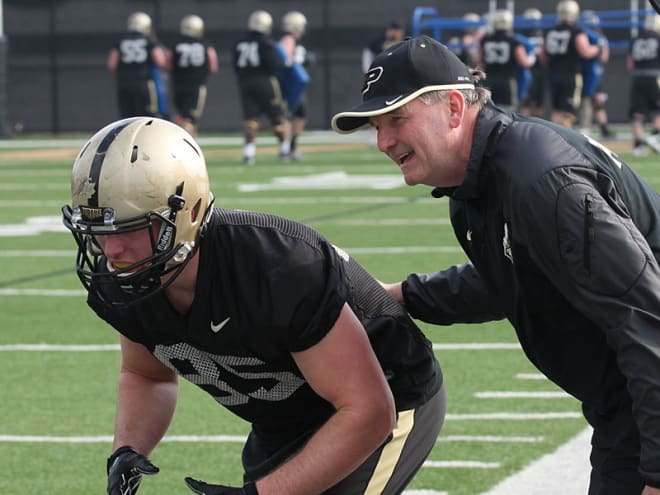Q&A with Purdue offensive coordinator Terry Malone
Terry Malone is eager to see what he has in his two quarterbacks.
The offensive coordinator - Malone was hired to replace John Shoop following the season - likes the foundation of the offense he inherits, its running back, receivers, the three returning offensive linemen. But the veteran OC, having had great success in the early 2000s at Michigan, knows much starts with the quarterbacks. And this spring, Purdue will have incumbent starter David Blough and Elijah Sindelar.
"We have a lot of work to do between now and then, but I wish we were starting spring practice right away because that’s the best way to wash the taste out of your mouth about what happened last year and start fresh," Malone said Friday. "I know (the quarterbacks) feel the same way. Not long after this (coaching changed) happened, both of those guys were on the phone and calling and saying 'I’m ready to go to work and I’m ready to get this thing turned around.'"
Following are excepts from Malone's interview. For the full 20-plus minutes, including an interesting take on play-calling, watch Friday's edition of 'Gold and Black LIVE.'

Gold and Black: What do you for your offense at Purdue?
Malone: "There’s a lot of pieces to the puzzle that we have to make sure we put together in the right way. What this opportunity gives us is a chance to really start over again and evaluate what went well for us and what didn’t, try to keep up with the trends in football and how to make plays and score touchdowns. Right now, it’s really a process of our staff getting to know each other, evaluating what happened last year and making some good decisions for the future.
Gold and Black: Has football changed since you were the offensive coordinator at Michigan in the early 2000s?
Malone: “Yeah, it certainly has (changed). The tempo offense has added something to it. If you look at what Drew Brees did when he was here, there was a lot of elements of tempo that they had, when Coach (Joe) Tiller was here, and that’s when we really started seeing it. They were substituting on the run, getting to the line of scrimmage fast and trying to keep the defense on their heels. Really, I think that’s when we first started seeing it, being able to spread the field out certainly has changed things. When I was at Michigan, we were a power football team and yet we had a West Coast style of passing, so there’s going to be some different elements of our offense that maybe isn’t up with the trends, but are sound and are proven successful.”
Gold and Black: What do you feel you have from a personnel standpoint that can serve as a foundation for what you want to do?
Malone: “That’s a big part of what the game is all about is being able to put guys into the right positions and give them a chance to be successful. If you look at our offense that’s coming back, we return three offensive linemen who are really good players and I think we’ve got a couple of really good linemen who are going to fill in those other two spots. We’ve got a great young tailback, and we need to make sure he has enough touches throughout the day to give us a chance to make yards with. I think we’ve got an excellent receiving corps. We probably have more depth there than at any position. We’ve got some good solid, young tight ends that we can take advantage of.
“The most important position, when you’re talking about offensive football, is the quarterback position. We’ve got some young guys who are great guys and great football players, and we need to put them in a position where they can be successful. We have to be able to determine what they do best and feature that.
“A really good lesson when I first got to the Saints, we were going to draft a quarterback to be our guy in 2006. So we put a playbook together that was kind of built for what us coaches thought was a good plan and good communication. Then when we signed Drew, everything changed. We went back in and Coach (Sean) Payton had us change the whole playbook so that Drew would be most comfortable with (it). We used all the terms that came out of San Diego that he had been comfortable with and changed everything because what Sean said, and it’s true, if your quarterback is not comfortable in this offense then it doesn’t matter how comfortable the coaches are. We’re going to do everything we can to develop and nourish and put our quarterbacks in position to be successful.”
Gold and Black: A lot of people at Purdue feel like you have to do something different offensively to be successful – throw the ball a bunch or something – is there room for innovation within what you envision the offense?
Malone: “When things aren’t going the way you want them to, you’re always looking for ways of changing. A lot of times, you end up looking across the street and seeing the neighbor’s yard and seeing something you really like in the neighbor’s yard and that’s what we should be doing at our place.
“… That’s really a natural reaction, to say, ‘This is not working for us. Let’s go do what they’re doing.’ We’re kind of doing that right now as an offensive staff, really investigating some of the best college football teams and seeing how they win, seeing how they attack defenses and getting some of their ideas and putting them together for our best plan.”
Gold and Black: There has to be a basic foundation, because there’s so much going on offensively, not only in college football but professionally, across the country. How hard is it to pick and chose what you want and make it into something workable?
Malone: “That is really the magic potion on putting together a great offense is understanding how much your guys can handle, understanding how it fits on a weekly basis. You can’t come up with a brand-new offense every week. You have to have a foundation you build from. That’s basically what we’re doing right now is we’re doing a lot of investigative work in terms of what we did last year compared to what we see out there as being ways of attacking defenses and then putting together a plan that’s concise and well-thought out. Then we have to stick to that plan. We have to get better at executing what we do than defenses are at taking it away.”
Gold and Black: Question from a viewer: Do you need a “basketball on grass mentality” to have success offensively at Purdue?
Malone: “That’s a very good point. I still think this: Even if you play a type of basketball on grass, you still have to execute the principles of football. The one thing that will never change in football is you need to be a physical football team. Even when Purdue was throwing it all over the lot, they had an offensive line that was a physical bunch of guys. When you played against them, you were going to get a bloody lip because they were going to hit you. That mentality can’t change.
“We have to be a really tough football team. That’s what we’re really pointing to. I don’t think you have to go out and do something that no one else has done. You just have to go out and execute at the top of your game.”

Visit the Purdue Union

Copyright, Boilers, Inc. 2016. All Rights Reserved. Reproducing or using editorial or graphical content, in whole or in part, without permission, is strictly prohibited.
